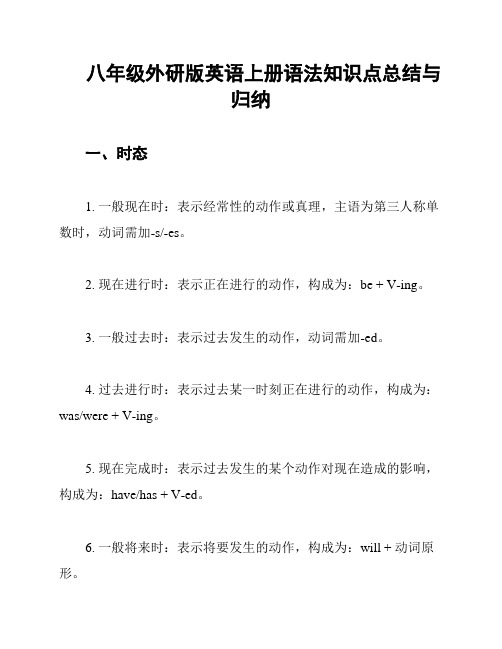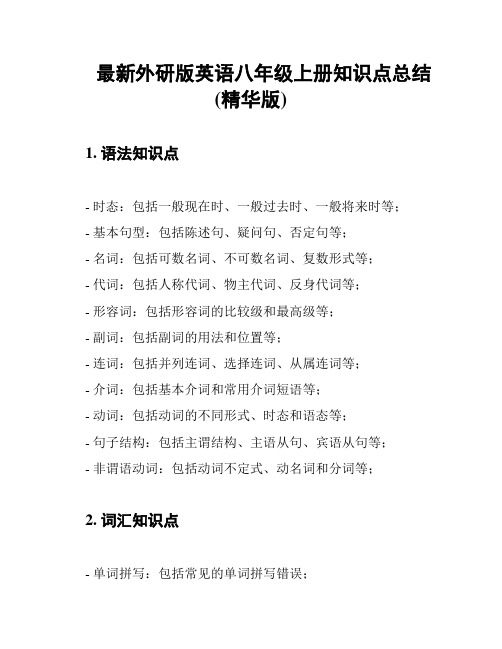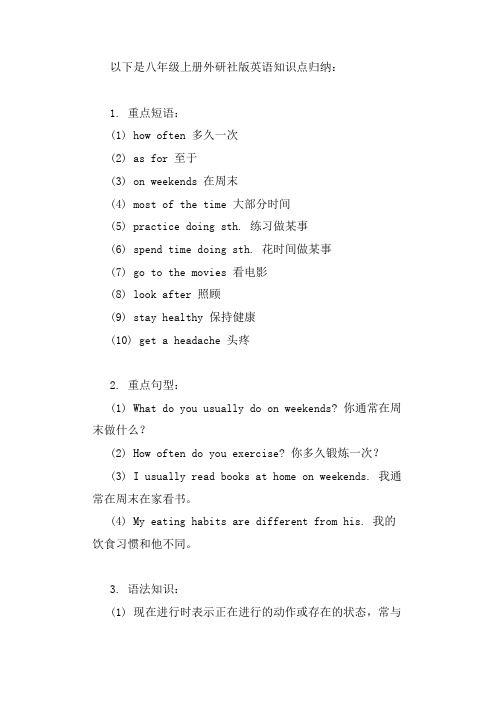新版外研社八年级英语上册重点知识总结整理版
【外研版】八上英语知识点归纳总结

【外研版】八年级(上册)英语:知识点归纳总结Module1How to learn English1.advice(1)意思是“意见,建议”,为不可数名词,可用some,much,a piece of,pieces of等修饰,不能说an advice或many/a few advices。
(2)表示“有关……的建议”时,用介词on,接名词、代词或由疑问词引导的不定式。
e.g.Let's ask for his advice on what to do next.常见搭配:take/follow one's advice接受某人的建议ask for advice征求意见拓展:advise vt.建议常见搭配:advise sb.to do sth.e.g.My teacher advises me to leave now.老师建议我现在就离开。
2.Each time you will learn something new.I also advise you to talk about the films or songs with your friends.每次你将会学习一些新东西。
我也建议你和朋友们谈论电影或歌曲。
time的用法:(1)time指“时间”用作不可数名词,前面可much,little,a lot of,plenty of等修饰。
(2)当作“次数;倍数”讲时,time是可数名词。
e.g.I have been to Beijing three times.(3)time构成的短语:at a time一次,每一次at one time曾经,一度at times/from time to time有时,偶尔all the time总是,一直in time及时,迟早on time准时(4)time构成的句型:①It's time for sb.to do sth./It's(high)time sb.did sth.该是某人干……的时间了。
初二上英语外研版知识点归纳总结

初二上英语外研版知识点归纳总结英语外研版是我们初中英语教材的一种,旨在帮助学生提高英语听、说、读、写的综合运用能力。
下面是初二上英语外研版的知识点归纳总结。
一、语法知识点1. 时态和语态:学习一般现在时、一般过去时、一般将来时、现在进行时、过去进行时等的用法,以及被动语态的构成和用法。
2. 名词:了解普通名词、专有名词、可数名词、不可数名词等的基本用法,以及名词的复数形式和所有格的构成。
3. 代词:熟悉人称代词、物主代词、反身代词、指示代词等的用法和形式。
4. 冠词:理解定冠词、不定冠词和零冠词的区别和用法。
5. 形容词和副词:学习形容词和副词的用法、比较级和最高级的构成方式,并能正确运用。
6. 数词:掌握基数词和序数词的用法,以及它们在句中的位置。
7. 介词:了解常见的介词及其用法,如in、on、at、by等。
8. 连词:熟悉并能正确使用并列连词、选择连词、原因连词、结果连词等。
9. 从句:了解主从复合句的构成和用法,包括宾语从句和定语从句等。
二、词汇知识点1. 日常生活词汇:掌握与学生日常生活密切相关的词汇,如身体部位、学科、家庭成员等。
2. 动词短语:学习常用的动词短语,如get up、go on holiday、take care等。
3. 学科词汇:了解和掌握与英语学科相关的词汇,如book、notebook、dictionary等。
4. 食物词汇:熟悉和运用与食物相关的词汇,如fruit、vegetable、meat等。
5. 动物词汇:学习各种动物的名称,如elephant、panda、tiger等。
三、阅读技巧1. 短文阅读:熟悉短文的结构,能快速获取信息和理解文章的主旨。
2. 阅读策略:掌握一些有效的阅读理解策略,如扫读、略读、细读等。
3. 理解词义:通过上下文来推断词义,提高词汇理解和运用能力。
四、听力技巧1. 日常交际:提高听懂常用的日常交际语言,如问候、道歉、提问、回答等。
2. 短对话和长对话:理解并提取对话中的关键信息,回答问题或完成任务。
八年级外研版英语上册语法知识点总结与归纳

八年级外研版英语上册语法知识点总结与归纳一、时态1. 一般现在时:表示经常性的动作或真理,主语为第三人称单数时,动词需加-s/-es。
2. 现在进行时:表示正在进行的动作,构成为:be + V-ing。
3. 一般过去时:表示过去发生的动作,动词需加-ed。
4. 过去进行时:表示过去某一时刻正在进行的动作,构成为:was/were + V-ing。
5. 现在完成时:表示过去发生的某个动作对现在造成的影响,构成为:have/has + V-ed。
6. 一般将来时:表示将要发生的动作,构成为:will + 动词原形。
7. 现在完成进行时:表示过去开始进行的动作一直持续到现在,并可能持续下去。
构成为:have/has been + V-ing。
二、被动语态1. 被动语态的构成为“be + 过去分词”,被动语态的主语通常是动作的承受者。
2. 被动语态的时态和语态都可以通过助动词“be”加以表示。
三、情态动词1. 情态动词共有9个:can, could, may, might, must, shall, should, will, would。
2. 情态动词用于表示说话人的态度、感情或是某种推测,通常搭配动词原形使用。
四、关系代词1. who/whom:指人,作主语用who,作宾语或补语用whom。
2. whose:指人或物,表示所有关系。
3. that:指人或物,作主语、宾语、表语、定语等,引导限制性定语从句。
4. which:指物,作主语、宾语、表语、定语等,引导非限制性定语从句。
五、虚拟语气1. 虚拟语气用于表示现在或将来的假设情况或与过去相反的情况。
2. “if”引导的虚拟条件句中,主句通常要使用情态动词;与过去相反的虚拟语气要使用“were”。
六、倒装句1. 完全倒装:将助动词或情态动词提到主语前,用于表示强调或出乎意料的语气。
2. 部分倒装:将助动词、情态动词、系动词等提到主语前,用于表示疑问、否定、祝愿等语气。
(完整版)八年级上册外研社版英语知识点归纳,推荐文档

英语初二上册重点知识点讲解Module 1 How to learn Englishpair n. (相关的)两个人,一对,一双,一副a pair of socks a pair of gloves two pairs of trousers一双袜子一副手套两条裤子e.g.A pair of teenage boys are watching a football game.两个青少年正在看足球赛。
2.correct(1)v. 改正,纠正e.g.The teacher returned to her room to correct exercise books.老师回到房间去改练习本。
Correct the spelling.纠正拼写。
(2)adj. 正确的;恰当的e.g.correct pronunciation 正确发音Do you have the correct time?你的表走得准吗?3.advice(1)n.意思是“意见,建议”,为不可数名词,可用some,much,a piece of,pieces of 等修饰,不能说an advice 或many/a few advices。
(2)表示“有关……的建议”时,用介词on,接名词、代词或由疑问词引导的不定式。
e.g.Let’s ask for his advice on what to do next.我们去征求一下他的意见下一步该怎么办。
常见搭配:take/follow one’s advice 接受某人的建议ask for advice 征求意见accept/refuse one’s advice 接受(拒绝)某人的建议offer advice to sb. 向某人提供建议拓展:advise vt.建议常见搭配:advise sb. to do sth.advise that sb. (should) do sth.e.g.My teacher advises me to leave now.老师建议我现在就离开。
外研社英语8年级上册

外研社英语八年级上册知识点总结一、重点词汇解析1.almost /ˈɔːlməʊst/:几乎,差不多。
-例句:It's almost time to go.(差不多该走了。
)-辨析:nearly 和almost 意思相近,但almost 语气更强,在表示“接近”“快要”时,两者可以通用。
2.bored /bɔːd/:厌烦的,厌倦的。
-例句:I'm bored with this book.(我对这本书感到厌烦。
)-辨析:boring 表示“令人厌烦的”,修饰物;bored 表示“感到厌烦的”,修饰人。
3.lonely /ˈləʊnli/:孤独的,寂寞的。
-例句:She lives alone and feels lonely.(她一个人生活,感到很孤独。
)-辨析:alone 表示“独自的”,强调客观状态;lonely 表示“孤独的”,强调主观感受。
4.excellent /ˈeksələnt/:优秀的,极好的。
-例句:She is an excellent teacher.(她是一位优秀的老师。
)-构词法:excel(突出,擅长)+lent(形容词后缀)。
5.population /ˌpɒpjuˈleɪʃn/:人口。
-例句:The population of the city is increasing.(这个城市的人口在增加。
)-用法:表示“某地的人口”时,常用“the population of + 地点”;询问人口数量时,用“What's the population of...?”。
二、重点短语1.quite a few:相当多,不少。
-例句:There are quite a few people in the park.(公园里有相当多的人。
)2.of course:当然,自然。
-例句:—Can I borrow your pen? —Of course.(—我能借你的笔吗?—当然可以。
八年级上册外研社版英语重点考点梳理

八年级上册外研社版英语重点考点梳理Unit 1: Great to be back!Vocabulary- Words and phrases related to school subjects and activities such as "math," "biology," "history," "P.E.," and "homework."- Adjectives to describe school life such as "interesting," "exciting," and "boring."Grammar- Present simple tense: used for general truths, habits, and routines.- Question words: "what," "who," "where," "when," "why," and "how."ReadingUnit 2: What's the matter?Vocabulary- Words and phrases related to health and illnesses such as "headache," "sore throat," "stomachache," and "fever."- Adjectives to describe feelings such as "happy," "nervous," "tired," and "excited."Grammar- Present continuous tense: used to talk about actions happening at the moment of speaking.Listening- Listening exercises related to expressing health conditions and giving advice.Unit 3: How do you study for a test?Vocabulary- Words and phrases related to studying and test preparation such as "review," "notes," "flashcards," and "study schedule."- Adjectives to describe study habits such as "organized," "focused," and "distracted."Grammar- Modal verbs: "should," "shouldn't," "must," and "mustn't."- Adverbs of frequency: "always," "often," "sometimes," and "never."Writing- Writing prompts about study habits and test preparation.Unit 4: What would you do?Vocabulary- Words and phrases related to ethical and moral choices such as "honesty," "courage," "loyalty," and "kindness."- Adjectives to describe personal characteristics such as "brave," "trustworthy," and "generous."Grammar- Conditional sentences: "if" clauses with "will" and "would."Speaking- Speaking activities discussing hypothetical situations and moral choices.Unit 5: Is your food killing you?Vocabulary- Words and phrases related to food and healthy eating such as "vegetarian," "organic," "nutrients," and "junk food."- Adjectives to describe food and flavors such as "spicy," "sour," "delicious," and "disgusting."Grammar- Present perfect tense: used to talk about past experiences and actions with a connection to the present.- Indefinite pronouns: "somebody," "anybody," "something," "anything," "nobody," and "nothing."Reading- Reading passages about food choices and their impact on health.Vocabulary- Words and phrases related to future plans and career choices such as "engineer," "pilot," "teacher," and "artist."- Adjectives to describe personal interests and goals such as "creative," "patient," "ambitious," and "hardworking."Grammar- Future with "going to": used to talk about future plans and intentions.- Wh-questions with "be": "What are you going to be in the future?"Listening- Listening exercises about future aspirations and career paths.Unit 7: Would you mind turning down the music?Vocabulary- Words and phrases related to daily activities and requests such as "cleaning," "cooking," "taking a shower," and "lending."- Adjectives to describe living conditions and preferences such as "noisy," "quiet," "clean," and "messy."Grammar- Requests with "Would you mind...?" and polite phrases: "Could you please...?"- Prepositions of place: "on," "in," "at," "under," "behind," "next to."Writing- Writing prompts about making requests and describing living conditions.Unit 8: What's it like to go to school in China?Vocabulary- Words and phrases related to education systems and customs such as "primary school," "uniform," "extracurricular activities," and "national holidays."- Adjectives to describe school environments and experiences such as "strict," "demanding," "interesting," and "diverse."Grammar- Object pronouns: "me," "you," "him," "her," "it," "us," "them."SpeakingUnit 9: When was it invented?Vocabulary- Adjectives to describe technological advancements such as "revolutionary," "innovative," and "life-changing."Grammar- Simple past tense: used to talk about past events and actions.- Time expressions: "yesterday," "last week," "in 2005," "a long time ago."Listening- Listening exercises about the history and impact of various inventions.Unit 10: By the time I got outside, the bus had already left.Vocabulary- Words and phrases related to travel and transportation such as "ticket," "subway," "taxi," "bicycle," and "traffic."Grammar- Past perfect tense: used to talk about actions that occurred before another past event.- Phrasal verbs: "get on," "get off," "give up," "take off," "turn on."Writing- Writing prompts about travel experiences and transportation preferences.以上为八年级上册外研社版英语的重点考点梳理。
最新外研版英语八年级上册知识点总结(精华版)

最新外研版英语八年级上册知识点总结
(精华版)
1. 语法知识点
- 时态:包括一般现在时、一般过去时、一般将来时等;
- 基本句型:包括陈述句、疑问句、否定句等;
- 名词:包括可数名词、不可数名词、复数形式等;
- 代词:包括人称代词、物主代词、反身代词等;
- 形容词:包括形容词的比较级和最高级等;
- 副词:包括副词的用法和位置等;
- 连词:包括并列连词、选择连词、从属连词等;
- 介词:包括基本介词和常用介词短语等;
- 动词:包括动词的不同形式、时态和语态等;
- 句子结构:包括主谓结构、主语从句、宾语从句等;
- 非谓语动词:包括动词不定式、动名词和分词等;
2. 词汇知识点
- 单词拼写:包括常见的单词拼写错误;
- 同义词:包括一些常见的同义词辨析;
- 常用短语:包括日常交际中常用的短语;
- 常用惯用语:包括一些惯用语的正确使用;
3. 阅读技巧
- 阅读理解:包括快速阅读和细节理解;
- 阅读速度:包括提高阅读速度和理解能力的方法;
- 阅读技巧:包括推测词义、寻找关键词等技巧;
4. 写作技巧
- 书信写作:包括格式、语言表达和常用句型等;
- 日记写作:包括表达个人感受和经历的方法;
- 作文写作:包括如何组织思路和提高写作水平的方法;
以上是最新外研版英语八年级上册的知识点总结,希望对你的研究有所帮助。
最新外研版英语八年级上册知识点总结(精华版)

最新外研版英语八年级上册知识点总结(精华版)本文档旨在对最新外研版英语八年级上册的知识点进行精华总结。
以下是该教材的重点内容:单元一:Meeting New Friends- 介绍自己的姓名、年龄、家庭等个人信息- 学会与他人交流问候和介绍的常用表达- 了解不同国家的文化俗并进行比较单元二:Stories and Poems- 阅读和理解英语短篇故事和诗歌- 掌握故事和诗歌中的重要词汇和短语- 分析和解释故事和诗歌中的情节和主题单元三:My School Life- 描述学校的各项设施和活动- 研究各类研究用具及学科的名称- 探讨学校生活中的规则和责任单元四:Our Hobbies and Dreams- 谈论自己的兴趣和爱好- 表达对未来的理想和梦想- 了解其他人的兴趣和梦想,并进行对话和交流单元五:Explorers and Adventures- 介绍历史上的探险家和事件- 阅读和理解历史故事和传记- 研究关于探险和冒险的词汇和短语单元六:Healthy Living- 研究描述身体健康和生活惯的表达- 分享关于保持健康的经验和建议- 探讨健康生活方式的重要性总结本文档简要总结了最新外研版英语八年级上册的知识点,包括交流问候、个人介绍、故事和诗歌理解、学校生活、兴趣爱好、探险历史和健康生活等内容。
这些知识点将帮助学生提高英语听、说、读、写的能力,培养跨文化交流的能力。
请注意,本文档仅对教材内容进行了简要总结,具体内容和详细练请参考最新外研版英语八年级上册教材本身。
以上是对最新外研版英语八年级上册知识点的总结,希望对您有所帮助!。
外研版英语八年级上册所有知识点总结

• 15.all the time 一直
Module1——重点句型
• 一、提建议的句子: • 1.You(We) should do sth • 2.Let’s do sth • 3.Why not do sth • 4.Why don’t you(we) do sth • 5.How(What) about doing
• …for …有什么用
• 4. arrive at 到达(后接小地点) • 15. take…out of… 从…拿
• 5. once or twice 偶尔,一两次
出…
• 6. go off (灯)熄灭,(闹钟)响起 • 16. go across the road=
• 7.remember to do sth 记得去做某事
• 8. in the east of 在……的东部 • 9.be famous for=be known for • 因……而闻名 • 10.such as 比如 • lions of 数百万的 • 12.on the coast 在海滨,在海岸 • 13.be popular for 因…而受欢
• 7. on one’s way to…
• cross the road 过马路
• 在某人去…的路上
• 17. see/watch/hear sb do sth
• 8. run after 追逐,追赶
看见/听见某人做过某事
• 9. stop doing sth 停止做某事 • see/watch/hear sb doing sth • 看见/听见某人正在做某事
Module 8 重点词组
• 1. in time 及时 • 2. fall off… 从…跌落 • 3. pay attention 注意 • 4. pay attention to doing sth
(完整版)八年级的上册的英语外研版(新)各模块知识点归纳总结(全)_文档.docx

英语初二上册重点知识点讲解Module 1 How to learn English1. advice( 1)意思是“意,建”,不可数名,可用some, much, a piece of, pieces of 等修,不能 an advice 或 many/a few advices 。
( 2)表示“有关⋯⋯的建” ,用介on,接名、代或由疑引的不定式。
e.g. Let’ s ask for his advice on what to do next.常搭配:take/follow one ’s advice接受某人的建ask for advice征求意拓展:advise vt.建常搭配: advise sb. to do sth.e.g.My teacher advises me to leave now.老建我在就离开。
2. Each time you will learn something new. I also advise you to talk about the films or songs with your friends. 每次你将会学一些新西。
我也建你和朋友影或歌曲。
time 的用法:( 1) time 指“ ”用作不可数名,前面可much, little, a lot of, plenty of等修。
( 2)当作“次数;倍数” ,time 是可数名。
e.g.I have been to Beijing three times.( 3) time 构成的短:at a time一次,每一次at one time曾,一度at times /from time to time有,偶all the time是,一直in time及,早on time准( 4) time 构成的句型:①It ’s time for sb. to do sth./It ’ s (high) time sb. did sth. 是某人干⋯⋯的了。
外研八年级上知识总结

外研八年级上知识总结一、重要短语1. more and more 越来越多2. in the future 在未来3. do shopping 购物4. at the weekend 在周末5. get up 起床6. do homework 做作业7. go to bed 上床睡觉8. go to the cinema 去看电影9. on the/a weekend 在周末10. in a week 在一周内二、重点句型1. It will be + 形容词 + in + 时间段 + 表示未来某个时间点之前会发生的情况。
2. What will you do + 时间点?你将在什么时候做什么?3. How will you go to + 地点?你将如何去某地?4. Let’s + 动词原形 + 表示建议或提议。
5. What are you doing + 时间点?你正在做什么?6. When are you going + 动词不定式?你打算什么时候做某事?7. How long will it take you to do sth?做某事需要多长时间?8. It takes sb some time to do sth某人花费一些时间做某事。
9. I’m sorry to hear that听到这个消息我很难过。
10. I hope to do sth我希望做某事。
三、语法重点1. 将来时态的构成和用法。
2. 宾语从句的用法,包括连接词和语序。
3. 情态动词的用法,包括can、may、must等。
4. 现在完成时的用法,包括have/has been和have/has done的区别。
5. 形容词的比较级和最高级的用法。
6. 反身代词的用法,包括强调主语和表示强调等。
新外研版八年级上册英语全册期末复习必背知识点归纳

Module 1 How to learn EnglishUnit 1 Let's try to speak English as much as possible.必背单词1.correct (v.& adj.)改正,纠正;正确的;对的→correctly(adv.)正确地2.spelling (n.)拼写→spell(v.)拼写→spelt (过去式)3.practise(v.)练习→practice(n.)练习4.match(v.)找到与……相配之物,使相配;使成对→matches (第三人称单数)5.meaning (n.)意义;意思→mean(v.)意味着6.dictionary(n.)词典;字典→dictionaries(pl.)7.understand(v.)理解;明白→understood (过去式)8.advice(n.)意见,建议→advise(v.)建议→advise sb. to do sth.建议某人干某事9.should(v.aux.)应该→should do sth. 应该干某事10.possible(adj.)可能的→impossible(反义词)不可能的11.forget(v.)忘;忘记→forgot(过去式)12.pronounce (v.)发……的音→pronunciation(n.)发音13.key(adj.)关键性的,非常重要的→(n.)钥匙→keys(pl.)14.main(adj.)主要的;最大的→mainly(adv.)主要地15.agree(v.)赞同→agreement(n.)赞同16.pair n.(相关的)两个人,一对17.word n.词,单词;字18.complete v.把……填完整;使完全19.grammar n.语法20.letter n.字母21.aloud adv.大声地;出声地22.excellent adj. 极好的;优秀的必背短语23.look up 查;查找24.make a mistake 犯错误25.agree with sb.同意某人26.get to do sth. 逐渐做某事必背句子27.Let's try to speak English as much as possible.咱们尽量尽可能多地说英语。
八年级上册外研社版英语知识点归纳

以下是八年级上册外研社版英语知识点归纳:1. 重点短语:(1) how often 多久一次(2) as for 至于(3) on weekends 在周末(4) most of the time 大部分时间(5) practice doing sth. 练习做某事(6) spend time doing sth. 花时间做某事(7) go to the movies 看电影(8) look after 照顾(9) stay healthy 保持健康(10) get a headache 头疼2. 重点句型:(1) What do you usually do on weekends? 你通常在周末做什么?(2) How often do you exercise? 你多久锻炼一次?(3) I usually read books at home on weekends. 我通常在周末在家看书。
(4) My eating habits are different from his. 我的饮食习惯和他不同。
3. 语法知识:(1) 现在进行时表示正在进行的动作或存在的状态,常与now,listen,look等词连用。
结构是be动词+动词的ing形式。
如:I am doing my homework now. 我正在写作业。
(2) 现在进行时的一般疑问句和否定句的变化:把be动词提前,变成一般疑问句;在be动词后加not,变成否定句。
如:Are you playing football? 你们在踢足球吗?-No,we are not. 不,我们没有。
(3) 频度副词:表示动作发生的频率,如:always,often,sometimes,never等。
如:How often do youwatch TV? 你多久看一次电视?。
外研社英语8年级上册知识点归纳

外研社英语8年级上册知识点归纳外研社英语8年级上册知识点归纳第一部分:语法1. 一般现在时一般现在时表示经常性的或习惯性的动作,或者表示客观事实等。
例如:I usually get up at six in the morning.Water boils at hundred degrees Celsius.2. 一般过去时一般过去时表示已经发生了的动作或状态。
例如:I met him yesterday.He didn’t go to the party last night.3. 现在进行时现在进行时表示正在进行的动作。
例如:I am watching TV right now.They are having dinner together.4. 一般将来时一般将来时表示将来时发生的事。
例如:I will stay at home tomorrow.She won’t come to the meeting.5. 情态动词的用法情态动词包括 can、may、must、shall、should、will等。
它们用来表示一种语气、情态或者家庭中发生的事情。
例如:We should study hard for the exam.You must finish your homework before dinner.第二部分:词汇1. 动物动物类词汇,包括常见动物、动物的身体部位、动物的饲养和保护等。
例如:cat、dog、panda、lion、neck、tail、pet、zoo、wildlife等。
2. 食物食物类词汇,包括早餐、午餐、晚餐、小吃、饮品等。
例如:toast、milk、coffee、hamburger、pizza、salad等。
3. 旅行用语旅行用语类词汇,包括交通工具、旅行目的地、旅行中使用的语言等。
例如:by plane、train、bus、boat、beach、museum、souvenir等。
新版外研社八年级英语上册重点知识总结

新版外研社八年级英语上册重点知识总结Modulel How to learn EnglishI. Let' try to speak English as much as possible.尽可能多的I. We are goi ng to talk about good ways to learn En glish. 我们将谈论一些学英语的好方法talk to sb.对某人谈话talk with 和。
交谈3. Why not write dow n our mistakes in our no tebook?Why not do sth= why don 'you do sth.为什么不做..... 呢?只可跟动词原形4.lt' a good idea to spell and pronounce new words aloud every day.It ' a good idea to do sth. 做。
是个好主意5. How about liste ning to the radio?How about doing sth=what about doing sth 做....... 怎么样?6. Watch ing films and liste ning to songs are great ways to lear n En glish.看电影和听歌是学英语的好方法7.1 also advise you to talk about the films or songs with your friends.我也建议你跟你的朋友谈论电影和歌曲advise sb to do sth.建议某人做某事advise doing sth建议做某事8.1 am shy and I am afraid to speak to her.be afraid to do sth害怕做某事或不敢做某事be afraid of doing sth.担心会发生某事或某情况9. start a conversation 开始谈话10.It' n atural to forget new words!忘掉新单词是很合乎情理的It ' +adj + for sb. to do sth. 对某人来说做某事。
(外研版)初中英语八年级上册知识点归纳总结

(外研版)初中英语八年级上册知识点归纳总结Module 1一、重点短语1. look up 查;查找2. make a mistake 犯错误3. talk about 谈论;讨论4. speak English 讲英语5. write down 写下;记下6. next to 在……旁边;紧挨着7. listen to the radio 听广播8. be good for 对……有好处9. write to 给……写信10. a little 有点11. agree with sb. 同意某人12. talk to 跟……交谈13. send sth. to sb. 把某物(发)送给某人14. ask for 请求15. watch films 看电影16. be from 来自17. smile at 冲……微笑18. go to bed 去睡觉19. get up 起床20. think about 考虑21. make friends with sb. 与某人交朋友22. take sb. around sp. 带领某人参观某地23. a few 几个;一些24. invite sb. to 邀请某人到……25. be good at 擅长26. for example 例如二、重点句型1. advise sb to do sth 建议某人做某事2. be afraid to... 害怕做……3. be good for... 对……有好处的4. be (a) great way(s) to do sth 做……的(一种)好方法5. It is natural to do sth. 做某事是合乎常情的。
三、重点语法1. Why not...? = Why don’t + you (we / they...)...?意为“为什么不……呢?”,后接动词原形。
eg:Why not / Why don’t we help the old cleantheir rooms this afternoon?今天下午为什么不去帮助老人打扫房间呢?2. What / How about...? 意为“……怎么样?”,其中about 是介词,后接名词或动词-ing 形式。
最新外研版英语八年级上册知识点总结(精华版)

最新外研版英语八年级上册知识点总结(精华版)Module 1 How to learn English一.重点短语:try to do sth. 尝试做某事a piece of advice一条建议make a mistake犯错误three pieces of paper三张纸give sb. some advice给某人一些建议advise sb. to do sth. 建议某人去做某事write it down写下,记下this term这学期next term下学期ask for advice征求意见basic questions基本问题the meaning of……的意思talk to sb. 跟某人谈话write to sb. 写信给某人start a conversation开始一段谈话talk about sth. with sb.跟某人谈论某事as much / many as possible尽可能多地help sb.(to) do / with sth. 帮助某人做某事二.固定结构:1. practise doing sth. 练习做某事2. a number of +可数名词复数+V(复数)许多、很多3. the number of+可数名词复数+V(单数)……的数量9. one or two days一两天10. a (good ) way to do sth to do sth.做某事的(好)方法11. something new/old/interesting新/旧/有趣/的东西12. What about doing=How about doing…?做……怎么样?三.重点句型:1.What else? 还有什么其它的?2 It’s a good idea to do sth. 做…..是个好主意3. It is adj. + (for sb.) + to do sth. (对某人来说)做某事怎么样4. It is + adj. (形容词)+ (of sb.) to do sth.某人做某事某人怎么样. It is very kind of you to help me.你能帮我你真好。
外研版八上英语知识点总结归纳

外研版八上英语知识点总结归纳第一单元:The First Unit主要内容:个人信息、问候语、自我介绍、日常活动、爱好、国家和国籍等。
1.问候语:- Good morning/afternoon/evening.- How are you?- What's your name?- Nice to meet you.2.自我介绍:- My name is...- I am...3.日常活动:- get up- have breakfast/lunch/dinner- go to school- do homework- watch TV- play sports/games- go to bed4.国家和国籍:- countries: China, America, England, Japan, Australia - nationalities: Chinese, American, British, Japanese, Australian第二单元:The Second Unit主要内容:学校生活、课堂用语、学校设施、课程等。
1.学校生活:- go to school- have classes- play with friends- join clubs2.课堂用语:- set up- take out- open the book- listen to the teacher- read aloud- answer questions- write in your notebook3.学校设施:- classroom- library- playground- science lab4.课程:- Chinese- English- math- science- history- geography- art- music-PE第三单元:The Third Unit主要内容:家庭成员、在家的活动、情绪表达、表示喜欢和不喜欢等。
- 1、下载文档前请自行甄别文档内容的完整性,平台不提供额外的编辑、内容补充、找答案等附加服务。
- 2、"仅部分预览"的文档,不可在线预览部分如存在完整性等问题,可反馈申请退款(可完整预览的文档不适用该条件!)。
- 3、如文档侵犯您的权益,请联系客服反馈,我们会尽快为您处理(人工客服工作时间:9:00-18:30)。
Module1 How to learn English1.Let’s try to speak English as much as possible.尽可能多的1.We are going to talk about good ways to learn English. 我们将谈论一些学英语的好方法talk to sb.对某人谈话talk with 和。
交谈3.Why not write down our mistakes in our notebook?Why not do sth= why don’t you do sth.为什么不做.........呢?只可跟动词原形4.It’s a good idea to spell and pronounce new words aloud every day.It’s a good idea to do sth. 做。
是个好主意5.How about listening to the radio?How about doing sth=what about doing sth 做........怎么样?6.Watching films and listening to songs are great ways to learn English.看电影和听歌是学英语的好方法7.I also advise you to talk about the films or songs with your friends.我也建议你跟你的朋友谈论电影和歌曲advise sb to do sth.建议某人做某事advise doing sth建议做某事8.I am shy and I am afraid to speak to her.be afraid to do sth害怕做某事或不敢做某事be afraid of doing sth.担心会发生某事或某情况9.start a conversation开始谈话10.It’s natural to forget new words!忘掉新单词是很合乎情理的It’s +adj + for sb. to do sth.对某人来说做某事。
11.当million, billion, thousand等前有具体数词修饰时,他们不用加s,不加of。
若表示不具体数目时则加s,加of如果前面是several时,要么加s加of,要么不加s不加ofSeveral millions of years ago=several million years agoMillions of people around the world visit them daily to improve their English.Module2 My home town and my country1.----How was your weekend?-----Pretty good!相当好用于对How’s........?或what do you think of.....?作答2. In fact, it only became important in the 1980s. It’s getting bigger and busier.1) in fact 表示“事实上”。
2) in the 1980s 表示“在20世纪80年代”。
结构为“in the + 年+ s”。
e.g. in the 1930s 在20世纪30年3) become important 表示“变得重要”。
getting bigger and cleaner 表示“变得更大和更干净”。
become 和get 表示“变得”,用法等于be。
3.It’s on the coast near Hong Kong.在海岸线上4.Some day it will become as busy as Hong Kong.有一天它会变得跟香港一样繁忙1)as + 形容词/副词+ as 和……一样e.g. He is as tall as his brother.他和他的哥哥一样高。
2)not as + 形容词/副词+ as 不像……e.g. This dictionary is not as useful as you think. 这本字典不如你想象的那样有用。
5.It’s taller than many other buildings in Shenzhen.他比深圳一些其他的建筑物要高得多many other+名词复数一些其他的。
many others 一些别人6.What’s the population of Shenzhen?深圳的人口是多少The population of Shenzhen is larger than that of many other cities in China.深圳的人口要比中国其他城市的人口要大得多。
Population 是一个集合名词,常与定冠词the连用,作主语时谓语动词用第三人称单数。
例如:The world’s population is increasing faster and faster.当主语是表示“人口的百分之几、几分之几”时,谓语动词用复数About seventy percent of the population in China are farmers.中国大约有百分之七十的人口是农民。
Shenzhen is larger in population than Beijing.No, it isn’t. It’s smaller.It is on the river Cam and has a population of about 120,000.have a population of …表示“有……人口”。
指人口的多少用large或small。
7.My home town is especially(尤其) famous for it’s university.be famous for因为。
而出名be famous as 作为。
而出名8.It is best known for the White House.be known for 因为。
而出名be known as 作为。
而出名lions of tourists visit it every year to show respect to President Lincoln.Show respect to对。
表示尊敬10. There are lots of old buildings and churches to visit.lots of 表示“许多,大量的”,后面加可数名词或不可数名词。
例如:lots of buildings11. England itself is part of an island,…be part of 表示“是……的一部分”。
e.g. Taiwan is part of China.台湾是中国的一部分。
Module3 Nothing is more enjoyable than playing tennis.1.be popular with 受。
的欢迎2.What’s the score? Score n.得分v.得分、获胜、成功3.What’s the matter with you?你怎么了What’s the trouble with 。
?=what’s wrong with 。
?用来询问、谈论某人出了什么情况(看上去焦虑、难过或者生病)或者表示。
出问题了4.Watching is not dangerous and it’s more relaxing too!5.Nothing is more enjoyable than playing tennis.没有什么比打网球更令人高兴的了6.Never mind. There’s still plenty of time for them to score.Never mind 没有关系、不要紧、不要记在心上Plenty of后跟可数名词和不可数名词都行7、that means we have a better chance of winning.那意味着我们有更好的获胜的机会have a chance of doing sthhave a chance to do sth8、in the mornings and evenings, you can see people jogging in parks or along city streets.See sb. doing sth看到某人正在做某事See sb. do sth看到某人干了或经常干某事Module4 planes, ships and trains1. Maybe I should go to school by taxi.交通工具英语搭配:By bus = take the bus2、what about going by bike?What about doing= how about doing ......;怎么样3、the more information, the better.信息越多越好The+比较级;the +比较级越。
越。
Module 5 Lao She Teahouse1、I wanted to see Beijing Opera, so Lingling offered to take me there.我想去看北京京剧,所以玲玲主动提出带我到那。
want to do sth想做某事2、it was difficult to understand the words. But the actors and actresses were excellent.理解他们的话是很困难的,但是演员们很优秀3、We only planned to watch for an hour, but in the end, we stayed for three hours.4、LaoShe Teahouse gives a warm welcome to everyone from all over the world.give sb. a..... Welcom对某人表示。
欢迎Module 6 Animals in dange r1、I am more interested to see the pandas in the Wolong Panda Reserve我更感兴趣的是看到了卧龙熊猫保护区的熊猫interested adj.感兴趣的interesting adj.有趣的Sb. be interested in.... 某人对某事感兴趣(主语必须是人)Sth. be interesting.....某物令某人感兴趣(主语必须是物)类似的单词有:excited---exciting bored----boring moved---moving surprised---surprising2、It allow s people to get closer to them.它允许人们接近他们allow sb. to do sth 允许某人做。
